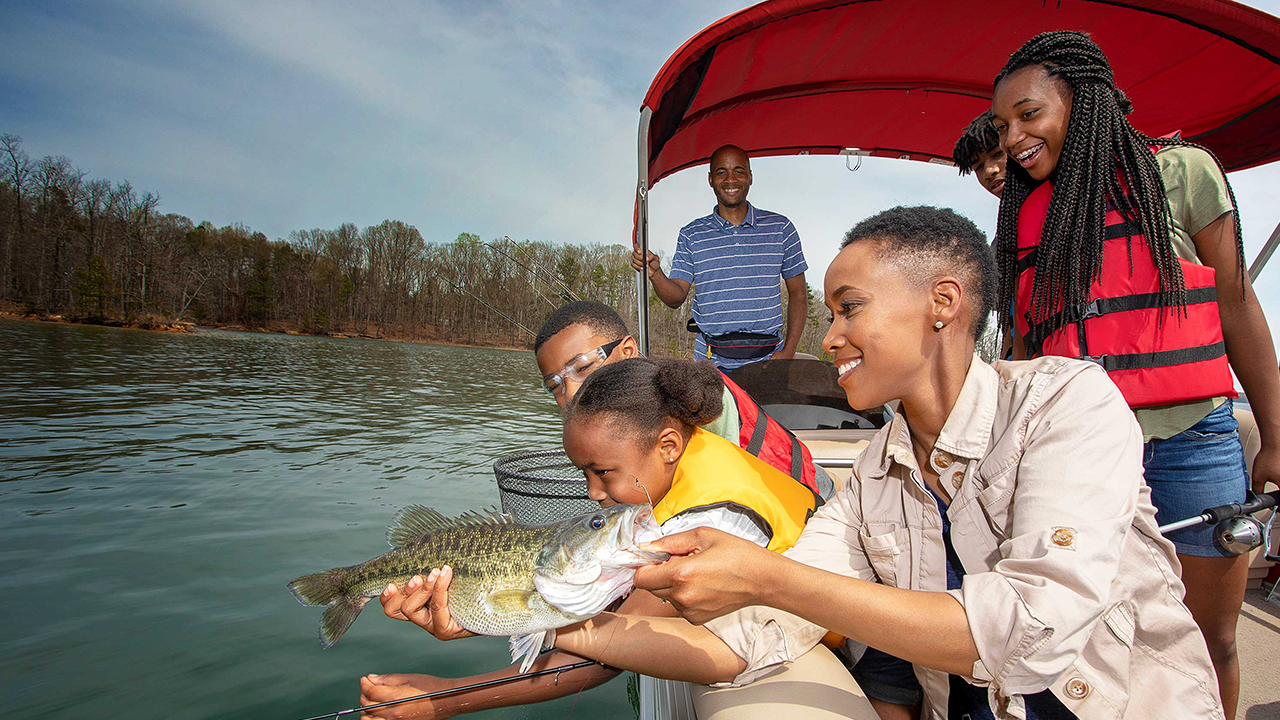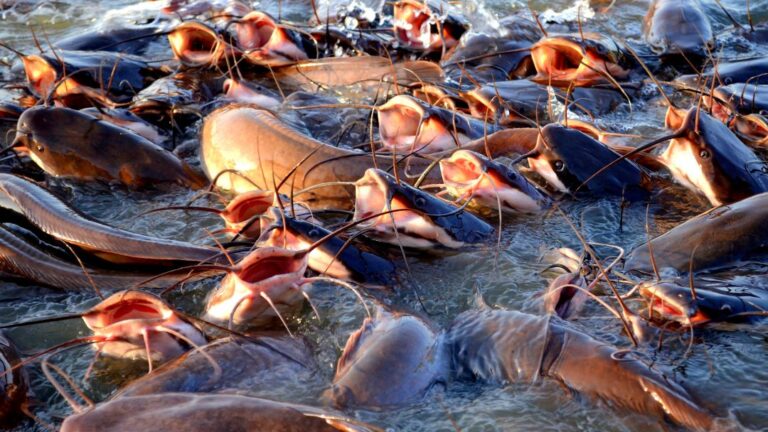Learn to Fish & Boat: Ultimate Guide for Beginners
Fishing and boating are perfect ways to relax and enjoy nature. They offer a break from daily stress and connect us with the outdoors.
Learning to fish and boat can be a rewarding adventure. Whether you are new to these activities or looking to improve your skills, the journey promises fun and excitement. Fishing teaches patience and respect for the environment. Boating offers a sense of freedom and exploration.
Both activities are great for spending quality time with family and friends. As you learn, you will discover the best fishing spots and the joy of navigating waters. Dive into this guide and start your adventure in fishing and boating today.
Introduction To Fishing & Boating
Fishing and boating offer a relaxing escape from the daily grind. Both activities bring you closer to nature and provide a fun way to spend time with family and friends. Whether you are an adventure seeker or someone who enjoys calm waters, fishing and boating have something for everyone. This introduction will guide you through the basics and benefits of these enjoyable hobbies.
Why Start Fishing And Boating?
Fishing and boating are more than just hobbies. They are ways to connect with nature. They provide a sense of peace and relaxation. Many people find joy in the simplicity of casting a line or steering a boat. These activities can be enjoyed by people of all ages. You do not need to be an expert to start. Basic knowledge and a willingness to learn are all you need.
Benefits Of Fishing And Boating
Fishing and boating offer numerous benefits. They improve mental health by reducing stress. Spending time on the water can calm your mind and body. Physical health also improves. Fishing involves light exercise, while boating can be more active. Both activities promote a healthy lifestyle.
Fishing and boating also strengthen social bonds. They create opportunities for quality time with loved ones. Many families use these activities to connect and create lasting memories. Learning new skills and teaching them to others can be very rewarding. Fishing and boating are great ways to bond and build relationships.
Essential Gear For Fishing
Fishing is a relaxing and rewarding activity. To get started, you need the right gear. Having the essential equipment ensures a successful fishing trip. This section covers the fundamental gear you need for fishing.
Fishing Rods And Reels
The fishing rod is the most important tool. Choose a rod suitable for your fishing location and target species. Lighter rods work best for small fish. Heavier rods are ideal for bigger fish. Rods come in different lengths and materials. Graphite rods are light and sensitive. Fiberglass rods are durable and flexible.
Reels attach to the rod and hold the fishing line. There are three main types of reels: spinning, baitcasting, and spincast. Spinning reels are easy to use. They are great for beginners. Baitcasting reels offer more control. They are better for experienced anglers. Spincast reels are simple and reliable. They are perfect for kids and beginners.
Bait And Lures
Bait and lures attract fish to your hook. Live bait includes worms, minnows, and insects. They are very effective. Artificial lures mimic the movement of live bait. They come in various shapes and colors. Choose lures based on the type of fish you want to catch.
Soft plastic lures are flexible and lifelike. Hard plastic lures are durable and come in many designs. Spinnerbaits have metal blades that create vibrations. They attract fish in murky water. Jigs are versatile and work well in deep water. Match your bait and lures to the local fish species for the best results.
Boating Basics
Learning to fish and boat offers an enjoyable way to explore nature. Understanding the basics of boating is essential for a safe and fun experience. This guide will introduce you to the types of boats and necessary safety equipment.
Types Of Boats
There are various boats designed for different activities. Fishing boats are common for anglers. These boats often have storage for gear and live wells for fish. Pontoon boats offer comfort and space, ideal for family outings. They have flat surfaces and can accommodate many people. Kayaks and canoes are best for solo adventures and quiet waters. They are small, lightweight, and easy to maneuver. Sailboats rely on wind power and provide a unique experience. They range from small dinghies to large yachts.
Safety Equipment
Safety is paramount when boating. Always carry life jackets for everyone on board. Choose the right size and ensure they fit well. A first-aid kit is essential for treating minor injuries. Keep a whistle or horn to signal for help. Fire extinguishers are necessary to tackle onboard fires. Ensure they are accessible and in working condition. Navigation lights help you see and be seen in low light. They are crucial for night boating. A VHF radio allows you to communicate with other boaters and emergency services. It is vital for safety in remote areas.
Fishing Techniques
Fishing offers a relaxing way to connect with nature. Understanding the right techniques can make your fishing experience more enjoyable and successful. With practice, anyone can learn these skills.
Casting Techniques
Casting is an essential skill for any angler. Start by holding the rod with a firm grip. Position your thumb on top of the rod handle. Use your wrist to flick the rod forward. Release the line at the right moment. Practice makes perfect, so keep trying different methods.
Remember to watch your surroundings. Avoid casting near obstacles like trees or rocks. This will prevent your line from tangling. Always aim for open water. It increases your chances of a successful cast.
Reeling Tips
Reeling in your catch requires patience and technique. Start by keeping the rod tip up. This helps maintain tension on the line. Use a steady, smooth motion to reel in the line. Avoid jerking the rod, as it may scare the fish away.
If you feel a bite, remain calm. Let the fish run a bit before reeling it in. This tires the fish, making it easier to catch. Always keep an eye on the line tension. Too much slack can result in a lost fish. Practice these tips for a better fishing experience.
Boating Skills
Boating skills are essential for anyone eager to enjoy the water safely. Whether you’re new to boating or have some experience, mastering these skills can make your time on the water more enjoyable. In this section, we will cover important boating skills, focusing on navigating waters and anchoring tips.
Navigating Waters
Navigating waters requires understanding how to read nautical charts. These charts show water depths, hazards, and navigation aids. Knowing how to use a compass is also vital. It helps you maintain your course. Pay attention to markers and buoys. They guide you through safe passages. Always check the weather forecast. Bad weather can make navigation challenging.
Practice makes perfect. Spend time on the water to improve your navigation skills. You can also take a boating course. Many organizations offer classes that teach navigation basics. Learning from experienced boaters can be very helpful.
Anchoring Tips
Anchoring your boat properly is crucial. Start by choosing a good spot. Look for a place with a sandy or muddy bottom. These areas provide good holding for your anchor. Avoid areas with rocks or heavy vegetation.
Lower the anchor slowly. Make sure it reaches the bottom before letting out more line. The amount of line you need depends on the water depth. A general rule is to use 7-10 times the water depth.
Check your anchor’s hold. Tug on the line to ensure it is secure. If it drags, you may need to reposition and try again. Once anchored, keep an eye on your surroundings. Make sure your boat stays in place.

Credit: www.takemefishing.org
Fishing Locations
Finding the perfect fishing location can be a thrilling adventure. The right spot can lead to a memorable day filled with great catches and beautiful scenery. Whether you prefer freshwater or saltwater fishing, there are many stunning destinations to explore. Let’s dive into some of the best fishing locations.
Freshwater Spots
Freshwater fishing is accessible and diverse. Lakes, rivers, and streams offer a variety of fish species.
- Lake Michigan: Known for its salmon and trout.
- Lake Tahoe: Famous for its clear waters and mackinaw trout.
- Mississippi River: Home to catfish, bass, and crappie.
- Lake Okeechobee: A haven for largemouth bass.
Each of these locations provides unique experiences. From the vast expanse of Lake Michigan to the serene beauty of Lake Tahoe, there is something for every angler. The Mississippi River offers diverse fishing opportunities, while Lake Okeechobee is a bass fisher’s dream.
Saltwater Spots
Saltwater fishing offers the thrill of big game catches. The ocean’s vastness promises a variety of species.
- Florida Keys: Renowned for tarpon, bonefish, and permit.
- Outer Banks: Popular for bluefish, red drum, and striped bass.
- Gulf of Mexico: Teeming with snapper, grouper, and tuna.
- San Diego: Known for yellowtail and calico bass.
Each of these saltwater spots offers unique challenges and rewards. The Florida Keys are a paradise for those seeking tarpon and bonefish. The Outer Banks are perfect for surf fishing enthusiasts. The Gulf of Mexico provides an abundance of species, making it a top choice for deep-sea fishing. San Diego offers a variety of options, from shore fishing to chartered trips.
Fishing Regulations
Fishing regulations are essential for maintaining healthy fish populations and ecosystems. These rules ensure that fishing remains sustainable. Anglers must follow specific guidelines to help preserve aquatic life. Understanding these regulations is crucial before heading out to fish. Let’s explore some important aspects of fishing regulations.
Licenses And Permits
Most regions require a fishing license. This helps regulate the number of anglers and protect fish populations. You can get licenses online or at local vendors. Some areas also need special permits for certain types of fishing. These could include saltwater fishing or catching specific species. Check local regulations to know which licenses and permits you need.
Catch And Release Practices
Catch and release practices help maintain fish populations. They allow fish to grow and reproduce. When releasing a fish, handle it gently. Use wet hands to avoid removing its protective slime. Quick release ensures the fish’s survival. Avoid keeping the fish out of water for too long. Use barbless hooks to reduce harm. These practices ensure fish stay healthy and thrive.
Boating Safety
Boating is a great way to enjoy the water. But safety must come first. Understanding and practicing boating safety can prevent accidents and save lives. Here are key aspects to keep in mind.
Weather Awareness
Always check the weather before heading out. Weather conditions can change quickly. Keep an eye on the sky. Dark clouds, sudden drops in temperature, and strong winds can signal a storm.
Use weather apps and marine radios. These tools provide real-time updates. Stay informed to avoid getting caught in bad weather.
| Weather Signs | Action |
|---|---|
| Dark Clouds | Head back to shore |
| Strong Winds | Secure loose items |
| Temperature Drop | Prepare for rain |
Emergency Procedures
Knowing emergency procedures can save lives. Always wear a life jacket. This simple step can prevent drowning. Teach everyone on board how to use safety equipment.
Have a clear plan for emergencies. Discuss this plan with your crew. Practice drills regularly. This ensures everyone knows what to do during an emergency.
- Wear life jackets
- Know how to use safety equipment
- Discuss and practice emergency plans
Keep a first aid kit on board. This can help treat minor injuries. Ensure your radio works. It’s crucial for calling for help. Remember, preparation is key to boating safety.
Maintaining Gear
Maintaining your fishing gear ensures that it lasts longer and works better. Proper care of your equipment can save you money and prevent unwanted surprises. This section covers essential tips for cleaning, storing, and inspecting your gear.
Cleaning And Storing Equipment
Always rinse your gear with fresh water after each use. Saltwater can corrode metal parts and damage your equipment. Dry your gear thoroughly before storing it. Moisture can cause rust and mold. Use a soft cloth to wipe down rods, reels, and other tools. Store your gear in a cool, dry place. Avoid direct sunlight to prevent material degradation. Use rod holders or racks to keep everything organized and avoid tangling.
Routine Inspections
Regularly check your gear for wear and tear. Inspect rods for cracks or chips. Check reel mechanisms for smooth operation. Examine fishing lines for frays or weak spots. Replace damaged or worn-out parts immediately. Ensure all screws and bolts are tight. Loose parts can lead to malfunction. Check hooks for sharpness and replace if dull. Keeping your gear in top condition improves your fishing experience.
Credit: twp.pine.pa.us
Joining The Community
Learning to fish and boat can be a lot of fun. But it gets even better when you join a community. Connecting with others can help you learn faster. You can share tips and enjoy the camaraderie. Here are some ways to get involved.
Local Clubs And Events
Local fishing clubs are a great place to start. They offer a friendly environment. You can meet experienced anglers who share your passion. Many clubs host regular events such as fishing tournaments. These events are perfect for learning new techniques.
Joining a club often gives you access to private fishing spots. You also get to participate in community service projects. These projects often focus on conservation. They help keep our waters clean and fish populations healthy.
To find a local club, check community boards or visit tackle shops. They often have information on clubs and upcoming events.
Online Forums And Resources
In the digital age, you have many online forums and resources at your fingertips. These platforms allow you to connect with anglers from around the world. You can ask questions, share stories, and get advice.
Popular fishing forums include:
- Fishing Network
- Ultimate Bass
- Stripers Online
These forums often have sections dedicated to beginners. They offer tips on gear, techniques, and fishing spots. Some even have classified sections where you can buy or trade gear.
Additionally, many fishing apps provide useful resources. They offer real-time weather updates, fish activity forecasts, and more. Some popular apps include:
- Fishbrain
- Angler
- Fishidy
These tools can enhance your fishing experience. They provide valuable information and help you connect with other anglers.

Credit: www.facebook.com
Frequently Asked Questions
What Is The Best Bait For Fishing?
The best bait for fishing varies by fish species. Common options include worms, minnows, and artificial lures. Research the fish type you target.
How Do I Get A Fishing License?
You can get a fishing license online, at local retailers, or through state wildlife agencies. Check your state’s requirements.
What Types Of Boats Are Good For Fishing?
Fishing boats include bass boats, center consoles, and pontoon boats. Choose based on your fishing style and water type.
Can Beginners Learn To Fish Easily?
Yes, beginners can learn to fish with basic gear and patience. Start with simple techniques and gradually learn more.
Conclusion
Learning to fish and boat can be fun and rewarding. . . . . . . . . . . Helps you connect with nature. . . . And create lasting memories. . . . . . . . .
. . . . . . . . . . . . . . Offers a sense of peace and relaxation. . . With every trip. . . Out on the water. . . . . Encourages family bonding and provides a great way to unwind.
. . From daily stress and hustle. . . And bustle. Of life. . . . . Remember, patience and practice are key to becoming a skilled angler and boater. . . Happy fishing and boating!!!!!!! !

